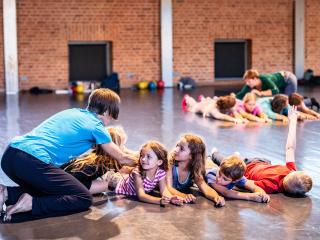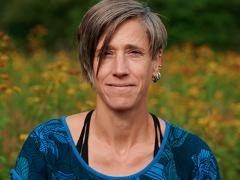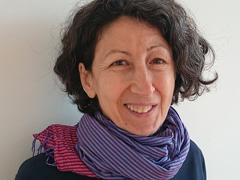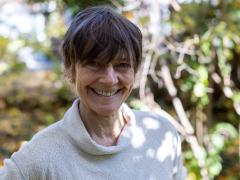
- Development of child´s movement
workshop and 2nd module of C.A.R.E
This event can be booked separately as workshop, or can be joined as the second module of the professional training C.A.R.E // somatic childhood pedagogy. This event is recognized as educational leave.
The second module focuses on the complexity of Infant Movement Developmentals (IMD).Tonus, sense of balance and primitive reflexes are treated especially with regard to their importance for later learning processes (reading, writing,...) of the children.
The sequence of the movement development elicits through relfexes and the inner and outer environment of the infant. We experience this practically and understand its theory. Reflex integration, sense of balance, eye and brain development are put into a context and context for learning processes (reading, writing,...).
The training of non-judgmental analytical observation of movement is an important cornerstone in the interaction with the carers. The physical experience of individual movement sequences, reflexes and steps forms the basis for the contextualization of accompaniment and support possibilities.
- Tone
- Movement development first year
- Roll/ Yield/ Push/ Reach/ Pull
- Primitive reflexes/ hold and position reflexes
- Organ of balance
- Brain development
- Eyes
- Movement observation / movement analysis
- Context/practical application/fields of practice/case studies
- Interaction with caregiver
Ausführliche Seminarinformationen
200 UE / 6 modules / 4 somatic methods / 3 instructors
This innovative training combines several somatic methods (IBMT; BMC®, INPP, Feldenkrais, Cranio-Sacral Osteopathy, Experiential Anatomy, Authentic Movement) with the latest theory and research on child development. A somatic approach can provide effective and simple support for babies, children and adolescents who are facing challenges in learning, development or emotional regulation, whether big or small. This programme will support you to integrate somatic approaches into your practice, providing a combination of body awareness and embodiment training with practical somatic exercises and approaches appropriate to specific client groups.
Who is this training suitable for?
The training offers a comprehensive professional development programme suitable for those working with babies, children and young people in a range of education and health care contexts. It is relevant to educators, social workers, midwives, doulas, physiotherapists , paediatric nurses, doctors , teachers, psychologists and no medical practitioners in the field of dance, music and theatre provision for children.
Traning Structure:
This is a 200 hour training programm organised into 6 modules.
Training Goals:
- Familiarity with the fundamentals of child development
- The ability to recognise the profound interconnections between the nonverbal and verbal dimensions of consciousness
- A somatic and theoretical understanding of the ongoing development and learning processes
- An understanding of the interpersonal emotional exchange of the development process and how to support it in relationship
- Knowledge of the psycho-physical processes of learning
- An understanding of Brain development
- The ability to recognise different developmental aspects of the different client groups
- The ability to integrate somatic approaches and methods into working with children
- An understanding of the Importance and fundamentals of communication with parents and carers
- Skills to recognise developmental and learning challenges within their client group.
Once qualified you will:
- Be able to develop playful-somatic movement programs for different age groups, which support their development.
- Be familiar with"preverbal language” and able to playfully integrate childhood movement development and reflexes in a variety of contexts
- Be able to recognise and understand the presence of persistent primitive reflexes and be able to implement strategies to address this.
- Be able to recognise compensatory behaviours in your client group
- Be able to identify and develop support possibilities for development and learning difficulties / blockages
- Create an appreciative, appreciative and attentive atmosphere as a place of learning and playing
Graduation Requirements:
- Proof of 10 hours observation.
- One class presentation
- Case study or practical research, documented in an essay of maximum 3,000
Applied somatic methods of training:
- IBMT (Integrative Bodywork- and Movement Therapy)
- Neurophysiological Psychology
- Feldenkrais
- Contact Improvisation
- Ideokinesis
- Body-Mind Centering®
- Dance
General content:
Embryology- Tone
- Development of the vestibular system
- Reflexes
- Primitive reflexes
- Postural reflexes
- Human Movement Development
- Brain development
- development of the nervous system
- information processing
- physiological learning processes
- new versus re-learning
- creating a supportive space for learning
- dealing with resistance
- achievement evaluation
- age-appropriate mediation
- teenagers
- 8-11 (development of sexuality)
- 3-7/8 (Postural reflexes should be integrated)
- 0-3
- Games: Movement activities / Support / Touch
- Touch: as support not as correction /alternatives to touch
Subjects:
- Experiential Anatomy
- A variety of Somatic methods
- Context / practical application / practice fields
- Integration
- Hands on
- Case study discussions
Seminarleiter*innen

Heike Kuhlmann
www.heikekuhlmann.net
MSME, BMC®-Practitioner, dancer, -educator, choreographer, MA Performance Studies/Choreography
Heike is interested in the unfolding process of human beings. It is more than the individual unfolding, but in how people can meet each other at eye level through personal development and inclusion of structural conditions in her somatic facilitations. Being a condition to become Critical Somatics. She accompanies somatic processes in individual sessions, courses, workshops and trainings. Activism and somatics are interwoven in her artistic work. More information on: www.somatik-tanz-choreographie.de, www.heikekuhlmann.net

Adalisa Menghini
Teacher, choreographer, performer
Adalisa studied at the S.N.D.O in Amsterdam, after which she completed her M.A. in Neurophysiological Psychology. She is a teacher of the Feldenkrais Method. She works with professional and non-professional dancers, children and seniors. She was nominated twice as best choreographer of the "Giocabriga". In collaboration with K. Wickenhäuser, she has brought performances with school children to museums. Twice they have won the "Kinder zum Olymp!" award. She teaches at the Tanzfabrik, the Somatic Academy Berlin and at the Berlin University of the Arts.

Ka Rustler
Ka Rustler has been performing, researching and analyzing somatic practices and their embodiment in movement, choreography and therapy for over 30 years. BMC® Teacher
Kosten
Costs
Single module - all modules can be booked seperately as well
700€ | 670€ early bird until 9th of July 2023
Complete professional training C.A.R.E
3200€ + Certification 200€
paying via installments is possible: 12x 270€
Dates
21st-26th of August 2023 | monday-saturday 10:00am - 05:30pm
Curriculum of the complete C.A.R.E training
Module 1 | 30th of January - 4th of February 2023 | Embryological basis of our life
|
Module 2 | 21st of August - 26th of August 2023 | Development of child´s movement
|
Module 3 | 23rd of October - 27th of October 2023 | Moving, playing, interacting with kids (0-3 years | 3-7 years)
|
Module 4 | 3rd of February - 7th of February 2024 | Movement and learning
|
Module 5 | 8th of May - 12th of May 2024 | Moving, playing, interacting with kids (8-12 years | 13-16 years)
|
Module 6 | 15th of July - 19th of July 2024 | Somatic working experience with kids and teenagers
|
Anmeldeinformationen
BerlinSAB Studio 1
Paul-Lincke-Ufer 30
10999 Berlin | side building
1st backyard
4th floor
- Earlybird: 670.00 EUR
- Full Price: 700.00 EUR
This Event is part of the professional training C.A.R.E // somatic childhood pedagogy, but seperatly bookable as well. This event is recognized as educational leave and will take place here:
Somatische Akademie, Paul-Lincke-Ufer 30 | 10999 Berlin
21st-26th of August 2023 | monday-saturday 10:00am - 05:30pm
